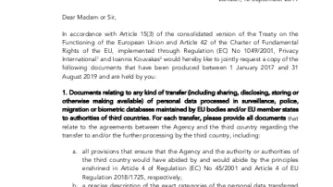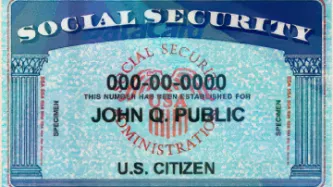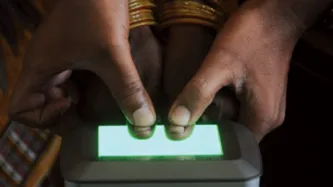Search
Content type: News & Analysis
After almost 20 years of presence of the Allied Forces in Afghanistan, the United States and the Taliban signed an agreement in February 2020 on the withdrawal of international forces from Afghanistan by May 2021. A few weeks before the final US troops were due to leave Afghanistan, the Taliban had already taken control of various main cities. They took over the capital, Kabul, on 15 August 2021, and on the same day the President of Afghanistan left the country.As seen before with regime…
Content type: Report
Privacy International has released a report summarising the result of its research into the databases and surveillance tools used by authorities across the UK’s borders, immigration, and citizenship system.
The report uses procurement, contractual, and other open-source data and aims to inform the work of civil society organisations and increase understanding of a vast yet highly opaque system upon which millions of people rely.
It also describes and maps…
Content type: Report
A common theme of all major pieces of national jurisprudence analyzing the rights implications of national identity system is an analysis of the systems’ impacts on the right to privacy.
The use of any data by the State including the implementation of an ID system must be done against this backdrop with respect for all fundamental human rights. The collection of data to be used in the system and the storage of data can each independently implicate privacy rights and involve overlapping and…
Content type: Case Study
In Peru, you get asked for your fingerprint and your ID constantly - when you’re getting a new phone line installed or depositing money in your bank account – and every Peruvian person has an ID card, and is included in the National Registry of Identity – a huge database designed to prove that everyone is who they say they are. After all, you can change your name, but not your fingerprint.
However, in 2019 the National Police of Peru uncovered a criminal operation that was doing just that:…
Content type: Case Study
Having a right to a nationality isn’t predicated on giving up your right to privacy - and allowing whichever government runs that country to have as much information as they want. It is about having a fundamental right to government protection.
For the first time since 1951, Assam - a state in the north east of India - has been updating its national register of citizens (NRC), a list of everyone in Assam that the government considers to be an Indian citizen. The final version, published in…
Content type: Long Read
Background
Kenya’s National Integrated Identity Management Scheme (NIIMS) is a biometric database of the Kenyan population, that will eventually be used to give every person in the country a unique “Huduma Namba” for accessing services. This system has the aim of being the “single point of truth”, a biometric population register of every citizen and resident in the country, that then links to multiple databases across government and, potentially, the private sector.
NIIMS was introduced…
Content type: News & Analysis
On 30 January 2020, Kenya’s High Court handed down its judgment on the validity of the implementation of the National Integrated Identity Management System (NIIMS), known as the Huduma Namba. Privacy International submitted an expert witness testimony in the case. We await the final text of the judgment, but the summaries presented by the judges in Court outline the key findings of the Court. Whilst there is much there that is disappointing, the Court found that the implementation of NIIMS…
Content type: News & Analysis
Photo by Ray Witlin / World Bank CC BY-NC-ND 2.0
This article has been written by Ambika Tandon, Policy Officer at the Centre for Internet and Society, in collaboration with Privacy International.
On October 17th 2019, the UN Special Rapporteur (UNSR) on Extreme Poverty and Human Rights, Philip Alston, released his thematic report on digital technology, social protection and human rights. Understanding the impact of technology on the provision of social protection – and, by extent, its…
Content type: Report
In September 2019, Privacy International filed 10 access to documents requests to EU bodies regarding the transfer of surveillance capabilities to non-EU countries. The requests seek documents providing information on the transfer of personal data, surveillance technology, training, financing, and legislation to non-EU countries. The requests were submitted to:
Frontex
Europol
The European Union Agency for Law Enforcement Training
The Directorate-General for Economic and…
Content type: News & Analysis
Photo: The European Union
“Border Externalisation”, the transfer of border controls to foreign countries, has in the last few years become the main instrument through which the European Union seeks to stop migratory flows to Europe. Similar to the strategy being implemented under Trump’s administration, it relies on utilising modern technology, training, and equipping authorities in third countries to export the border far beyond its shores.
It is enabled by the adoption…
Content type: Examples
In February 2019, the World Food Programme, a United Nations aid agency, announced a five-year, $45 million partnership with the data analytics company Palantir. WFP, the world's largest humanitarian organisation focusing on hunger and food security, hoped that Palantir, better known for partnering with police and surveillance agencies, could help analyse large amounts of data to create new insights from the data WFP collects from the 90 million people in 80 countries to whom it distributes 3…
Content type: Long Read
The Privacy International Network is celebrating Data Privacy Week, where we’ll be talking about how trends in surveillance and data exploitation are increasingly affecting our right to privacy. Join the conversation on Twitter using #dataprivacyweek.
It is often communities who are already the most marginalised who are at risk because of the privacy invasions of data-intensive systems. Across the globe, we see the dangers of identity systems; the harms of online violence against women and the…
Content type: Impact Case Study
What is the problem
For over two decades we have been documenting an alarming use and spread of surveillance. It is no longer just the wars on terror or drugs or migration that is driving this trend. The management of health crises and distribution of welfare regularly are among others being used to justify this turn to increasingly invasive forms of surveillance. From country to country we see the same ideas and the same profiteers expanding their reach.
When we first released our report on…
Content type: Impact Case Study
What happenedSince the late 1980s governments across the world have been trying to build identity registries. By the early 1990s, there were similar policies being pursued by a number of governments across the Pacific region, with similar technologies from the same companies. In the mid-90s ID cards became a ‘modern’ policy, implementing smart cards. By 9/11 biometric IDs became the preferred solution to undefinable problems. Then came vast databases of biometrics to identify people — with…
Content type: Examples
In 2015, the Swedish startup hub Epicenter began offering employees microchip implants that unlock doors, operate printers, and pay for food and drink. By 2017, about 150 of the 2,000 workers employed by the hub's more than 100 companies had accepted the implants. Epicenter is just one of a number of companies experimenting with this technology, which relies on Near Field Communication (NFC). The chips are biologically safe, but pose security and privacy issues by making it possible to track…
Content type: News & Analysis
Below is an excerpt of an article that recently appeared on Slate, written by our partner Kevin Donovon, a researcher at the University of Cape Town, and Carly Nyst, Head of International Advocacy at Privacy International:
"Move over, mobile phones. There’s a new technological fix for poverty: biometric identification. Speaking at the World Bank on April 24, Nandan Nilekani, director of India’s universal identification scheme, promised that the project will be “transformational.” It “uses…













